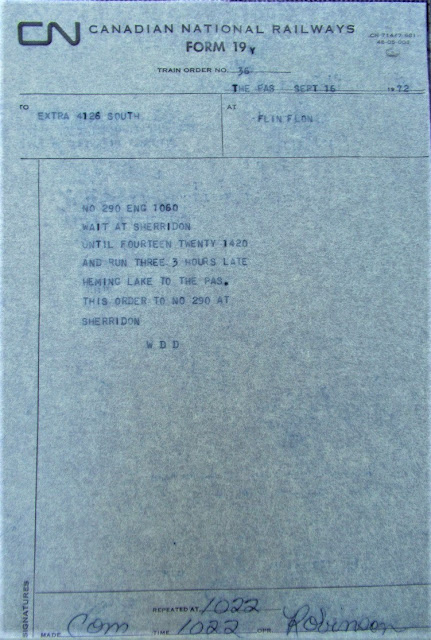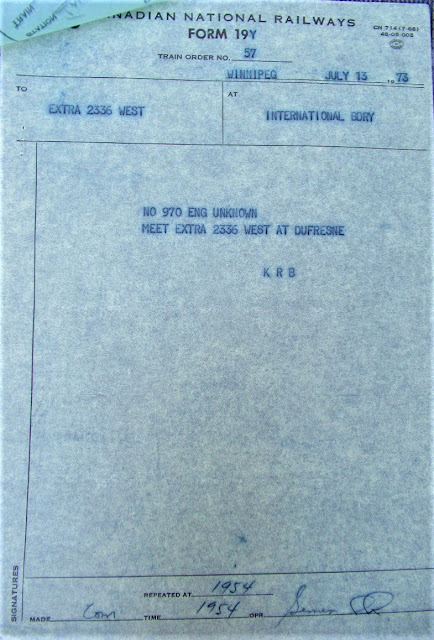I don't really like using the name ephemera for a couple of reasons, primarily because no-one ever knows what ephemera means. How about railroadiana, or railway paper items? No matter what term you use, I've realized that my days of collecting endless model railway equipment, heavy pieces of prototype railway equipment, and even big, thick books are pretty much over. I need something to collect that is more easily jettisoned when my good wife someday has to deal with it. And recyclable! That's it, railway paper! ("Ephemera!", echoes an ever-so-small ethereal voice!)
There are lots of different types of railway paper to collect. Rule books and union agreements are dense but dry, timetables a little more enticing, but I really like train orders because each one, like a train consist gives us a lot of information: a time, a place, events of the day, even who was working on that shift. And of course train numbers, engine numbers, mileages, and other pertinent facts all included together on tissue-thin pieces of paper. The importance of train orders far outweighs their diminutive proportions - they literally can mean the difference between life and death, safe passage or disaster. In this post, I'll share some of these Manitoba missives from my train order collection.
The wartime CP order (top photo) includes more stations and times than most orders, pertaining to a run across Manitoba in 1944. The above order was delivered at East Tower in 1950. The CN operator position there was abolished in 1964 with the advent of Centralized Traffic Control.
Written when Fort Rouge was a terminal (above).
A trip through northern Manitoba, with many of those place names being so interesting and imbued with much history, like Gillam (above) and just northwest of Portage la Prairie, Gladstone (below - belying a Century west of Winnipeg!):
As far north as you can get without hearing a 'splash', Churchill:
CP Neepawa, 1971:
Dauphin:
Flin Flon (below). Also at Flin Flon in September 1972, Eng 4253 run extra from Flin Flon to Chisel Lake, and in June, 1972 Work Extra 50419 protected against Extra 1073 South between Cranberry Portage and Simonhouse.
Grandview (below). Also at Grandview in September, 1983 was No 832 Eng 5363 meeting Extra 5205 West and Extra 5564 West at Togo; Extra 5582 West meeting No 832 Eng 5024 at Kamsack; and No 830 Eng 5591 at Meharry,
International Boundary, on the way to Duluth. Note the power, CN M-636 2336. As the Tragically Hip sang, "Ahead by a century":
CP La Riviere:
CP Minnedosa. Interestingly, classmate CP 4038 is preserved there: CP Molson:
Morris, note the GMD-1 for power:
Sifton:
CP Souris:
Thicket Portage:
Thompson (below). No 95 Eng 9151 had southward trains waiting until it arrived at Thompson Jct in a Form 19R accompanying this clearance. A further 19R had southward trains waiting at Sipiwesk until No 95 arrived at Gillam; then a Form 19Y allowing No 95 to leave Thompson Jct without registering; a slow order; then cars in siding: Thicket Portage 1, Pikwitonei 1, and Ilford 19.
CP Reston:
And we'll end the post the same way we began, with an order from Portage copied by CP operator Jack Corbett. My aunt and uncle from Portage knew Jack Corbett. He was a Mason and referred to my uncle as 'Doc'. He also had a large collection of Lionel trains!
It's interesting to have these paper snapshots of history. It's neat to see place-names and stations on the railway that are no longer manned, or no longer exist! In the form of train orders, they live on. Watch for upcoming posts from out West and down East!
Running extra...
It's great to be working with John More-Curran at Our Lakes e-magazine, a newsy e-publication focusing on South Frontenac Township and its lakes. The July Issue includes my inaugural 'Rails & Lakes' column about the Kingston & Pembroke Railway, and August will be the Canadian Northern Railway's turn. Now, when's that deadline? Oh, and did somebody say 'sweets'?
The fast-moving Canada Day fire in Lytton, BC claimed much of the deck of the CN bridge over the Thompson River there. In fact, Lytton marks the confluence of the Fraser and Thompson Rivers, and both CN and CP pass through on their way to the West Coast. It's expected the CN bridge is out of commission for one week:
























4 comments:
The northern Manitoba orders and clearances are very interesting to me for obvious reasons. Seeing GMD-1 1060 leading train 290 is very interesting as most photos I have seen of that train had GP9 or GP38-2W. Another excuse to use my GMD-1 on passenger trains. Also interesting to see an extra was headed by an SW1200RS at Thicket Portage. I'd be interested what the Form 19 at Thompson showed leading train 95 at Thompson, the clearance form covers it in your photo. It would be interesting to see more from northern Manitoba if you have any. Thanks for sharing these.
Marc Simpson
I appreciate your sharp eye, Marc. These orders are indeed unique!
I've added text from the orders you asked about to the post.
Those are the only orders I have from northern Manitoba. I also came across several from Saskatchewan: CN Prince Albert, Wakaw, Hudson Bay, Reserve, Montmartre and CP Webb, Outlook, Kerrobert and Gull Lake.
Ahd who could forget CP Manyberries, Alberta!?
Eric
Great post Eric! Very timely too as a debate broke out recently on my channel around the spelling of "nought". I've seen CP train orders in Alberta where they spelled it "knot" and this was also confirmed by a couple different CP folks employed in the road trades. The "nought" side definitely has more votes and by definition would be the correct spelling but I wouldn't be surprised to find it spelled "nought" "not" "knot" or "naught" depending on who wrote it down. The spelling of nought, naught, not and knot turned out to not be a boring subject! Thanks for the post and sharing the pictures of your train orders.
-Ben
Great to hear from you, Ben. Anytime I check in your Youtube, the layout is looking great and it makes mine look like a 4x8 on a ping-pong table!
I've only ever seen 'nought' and I can believe 'naught' but personally haven't heard of the other spellings. I would have to check the UCOR to see what was acceptable for train orders of the time, but as long as crews could understand it, it should have been based on whatever the dispatcher dictated and spelled out.
It's *not* the kind if thing I would *not* pay attention to, nor let it give me a *knot* in my stomach!
Thanks very much for your comment!
Eric
Post a Comment